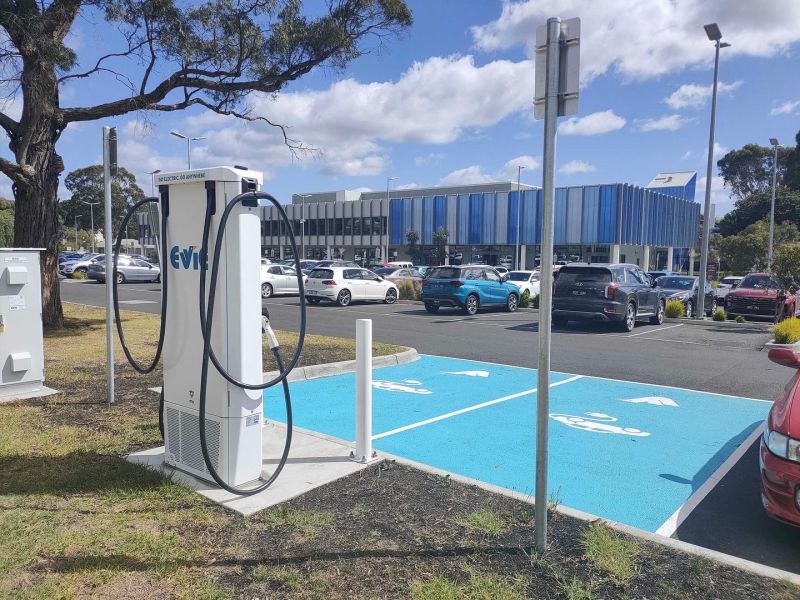Even though Australia’s inflation numbers are showing heart-warming signs of gently settling back into their preferred range, it seems we haven’t seen the last of the price rises. Having just published an article on what an EV costs to run on various mixes and providers of AC and DC charging – Evie has now announced a set of prices rises to apply from Thursday, January 18th. The new pricing structure is shown below:
| Charge rate/type: | Cents/kWh | ||
| New: | Old: | Up by: | |
| Evie 22kW (AC, 3 phase) | 50 | 35 | 43% |
| Evie 50kW DC fast chargers | 58 | 50 | 16% |
| Evie 150kW DC super-fast chargers | 68 | 60 | 13.3% |
| Evie 350kW DC ultra-fast chargers | 73 | 65 | 12.3% |
| Average price rise: | 21.2% | ||
Even at these new rates, the relativity between electric and petrol refuelling is still tilted heavily in favour of the BEV. It could also be argued that Evie’s prices were a bit low – especially as their AC price was below what some people pay at home for a peak kWh rate, so a correction was in order.
However, it would also be remiss of me not to point out that Evie seem to have not read the memo about it being irresponsible at this time to raise prices well above inflation. As can be seen from the ‘Up by’ column – their average price rise is 21%, with AC charging up by a whopping 43%!
Be that as it may: Evie don’t have a monopoly on EV charging. With the expanding number of chargers (and charging networks) across Australia, using Plugshare.com it is often now possible to find alternative charging network sites nearby.
Given their decision to increase prices was (to quote the email accompanying the announcement): “…driven by our commitment to investing in a top-notch, reliable, and expansive charging network across the country”, the result for Evie might be that, if people vote with their feet – Evie could see a reduction in their revenue with less to reinvest.
Personally, I won’t be stopping using the Evie network whenever they are the most convenient site on my route. Unlike before though, I will now be actively checking for alternatives when planning for each stop.
The bigger picture
All this does raise the question: “what is a fair price for public charging?”. Given the capital cost of buying and installing a charger, let alone maintaining it – are we still paying too little for the convenience of available and fast DC charging?
Along those lines, Electric Highway Tasmania uses a different model for setting prices that reflect the costs of operating a DC charger site. Their model uses an openly stated mix of three major inputs to an EV charger site:
- The kWh price for electricity (currently 30c/kWh).
- The capital cost of the equipment – which they call the ‘rental’ cost. This charge applies whenever the car is plugged in, irrespective of whether the car has completed its charge and is sitting idle.
Their rental costs are currently set at:
- 25c/min for 50kW DC chargers
- 15c/min for 24kW DC chargers
- 3c/min for AC chargers
- Parking fees for the council.
Whilst making it harder to calculate the cost of a charge beforehand, their model does make it plain that the kWh price is only one part of the overall cost of providing and running a charger site, as well as discouraging clogging a spot once the charge is completed.
All-up, EV charging is a new ballgame and – like all new business areas – some providers will thrive, some will die … and what becomes the ‘norm’ in terms of how we pay for EV charging is still to finalise.
Overseas, the petrol station model of signboards with price per kWh is starting to become the accepted model. In the UK, it is mandated that the price per kWh be prominently displayed and easily found before a charge session is started – plus, where bundled pricing occurs (e.g. parking included), the equivalent price for charging in price per kWh must be shown in addition to the parking price.
As to what we pay per kWh – that is likely something the market will decide, given if the networks become too expensive, they will lose a lot of their potential custom back to the domestic power point. (Unlike fossil fuelled vehicle owners, who are forever hostage to the machinations of the fuel price cycle).

Bryce Gaton is an expert on electric vehicles and contributor for The Driven and Renew Economy. He has been working in the EV sector since 2008 and is currently working as EV electrical safety trainer/supervisor for the University of Melbourne. He also provides support for the EV Transition to business, government and the public through his EV Transition consultancy EVchoice.

